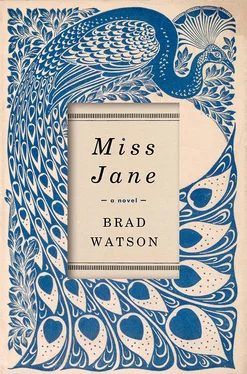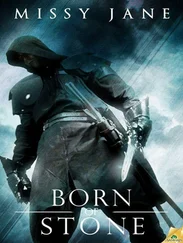“She had a good time,” he said finally, after she’d said nothing. Her expression didn’t change. She went back in. He took a long drink, coughed, rolled another smoke. He heard a dog barking off somewhere, maybe at the Key place, and thought about old Hound. How had Jane known he’d put the dog down, back then? He hadn’t spoken of it at all. He’d noticed the dog losing weight, walking like a cripple, eyes looking in pain, though he wagged his tail when Chisolm took up his rifle. Said he was going deer hunting and walked far down into the woods with the dog hobbling along, grabbed a shovel from his still shed along the way. They walked through the woods and out into the far pasture there and over to the very far edge of that. When he stopped walking, the dog plopped down, exhausted. He knelt next to him, stroked his forehead with a thumb. The dog looked up at him without raising his head.
“You got a broad forehead here,” he’d said to the dog, whose long ears lifted just the slightest at the words, then fell. “So you been around people a long time, you and those you came down from. What they say. People like a dog they can pet. Partial to the ones with your wide-set eyes.” The dog looked up at him again, but only a moment, too tired to even move his eyes anymore.
So then he’d done what he had to do. Out of kindness, he liked to think.
And when he’d gone back to the house with no deer and no dog, no one had said anything to him about it. Nor he to them.
ELIJAH TOOK TO riding over on Sunday afternoons on his bicycle to see her, and walked with her down to the pond and along the fences of the grazing pastures. The first time, they walked down to the edge of the woods bordering the lower pasture. Jane could hear her mother calling and could see her small figure up on the hill at the edge of their yard. They laughed and crossed the pasture back up toward the barn, behind the house, and into the leafed-out and budded pecan grove, the arrowhead-leafed shadows darting on the grass and on their faces as they passed through. They started for the barn but heard her mother calling out, closer now, Jane? and knew if they went in there she would come hustling up to scold and chaperone or herd them back to the house. So they sat down beneath one of the trees and took in the late spring air and let the breezes slide over them, breezes that felt to Jane like silken water, as if she were in the world but underwater. They looked down over the cattle pond and the stand of pines and small oaks beyond. Jane stole looks at him when she could, as he did at her, and when their eyes met they grinned and Jane felt that feeling run through her that thrilled her and kind of frightened her and, in some way she didn’t let herself hold on to, saddened her at the same time. How could a person’s face, his whole self, what was after all just an ordinary body, well shaped and good-looking but certainly another mortal walking around, come to seem so beautiful and take over a heart and a mind in that way? He wasn’t the only good-looking boy around, nor the only nice or even sweethearted one. But maybe he was. He seemed so, really, to her.
He was a little bashful. He was quiet. He wasn’t shy around people in general, it wasn’t that. She’d seen him banter and roughhouse with the others after church or lately along the wall of those waiting to dance again. But she could tell there was a softer kindness in him than most, if not all. So it seemed to Jane. She loved his sandy-colored hair, the smooth skin on his face, his clear blue eyes. He had dimples when he smiled that she imagined he didn’t like so much. It would embarrass a boy like him if she were to comment on them, so she held back on that, much as she would have liked to tell him how cute they were. But she was smart enough to know that boys didn’t like to be called cute.
She felt a little drunk. She’d had only a sip of buttermilk and a bite of bacon that morning, the only food in three days and the only thing besides a little water in two. She knew that was overly careful, and a longer stretch than usual, but the fasting had become a habit, one she enjoyed. In this state, an elevated sense of physical lightness and mental clarity, the Elijah Key sitting next to her seemed to be almost as much like something in a dream as in real life.
He looked at her, just a slight grin on his lips, head cocked back a bit the way he did.
“Are you all right?” he said.
She nodded her head. She wasn’t saying much of anything, to tell the truth. She nibbled the end of a stalk of Johnson grass she’d plucked on the way to the grove. The taste was sour and sweet at the same time.
He continued to look at her. The grin widened.
“What?” she said.
“Sometimes you seem like you’ve been hypnotized or something.”
“What’s that like?”
He’d seen one in town once, he said. A hypnotist. But it didn’t seem real. It seemed phony in an odd way. The hypnotist would do something like ask a person to close his eyes and he would talk to them in this lullaby way, not singing, just talking real quietly, or calm, or he might do that thing where he swung a pocket watch on its chain back and forth while he was talking and made the person go into a trance, and they would do anything he said to do.
“What kind of things?”
“Silly things, mostly. Like go over and drink a glass of water that’s not really there. I don’t know. I got bored at some point. But I thought it was funny the way the people would kind of go out of it, like they weren’t all there.”
“I’m all here.”
“I didn’t mean that. Anyway, when the hypnotist wanted to bring the man or woman out of the trance , he would snap his fingers in front of their face, like this,” and he snapped his fingers in front of Jane’s face. She laughed.
He got up and walked in a kind of slow circle in front of where she sat, hands in pockets, toeing at a fallen nut or twig here and there. He wore a pair of old Keds without socks and he kicked out of them and spread his toes in the grass.
“I could go barefoot all the time,” he said. “One thing I don’t like about working or going to school is wearing shoes.”
“I bet they’d let you dance at the dances without shoes.”
“I bet I’d get my toes stepped on all the time, ’cause that happens with shoes on, anyway.”
“I’ve never stepped on your toes.”
“No, you’re the best dancer, you really are.”
She looked away, embarrassed.
“I mean it. You’re a natural.”
“Do you like me?”
After a moment—“Yes.”
“Is that why you like me, ’cause I’m a good dancer?”
“That’s one thing I like about you.”
“What else do you like about me?”
He grinned and laughed, worked his shoes back onto his feet without using his hands, buying time or thinking.
“What?”
He hesitated, then reached up to take off his glasses and put them into his pocket. As if he was embarrassed to see her with the full clarity of vision they gave him.
“All right. Well. You’re pretty. And you’re nice. You’re not stuck up like other pretty girls, or most of them anyway. You don’t talk a lot of junk.”
“Maybe I don’t have much to say.”
“I’d bet you do. You just don’t talk just for the sake of jabbering on. Sometimes I think most girls jabber on so much because they’re afraid of not talking, or being with somebody and just being quiet. But that’s when you can really see somebody, when they’re quiet.”
He stopped and looked at her.
“Do you ever do that with animals, just sit and watch them, not saying anything, and just let everything get quiet until you can kind of hear everything, everything you couldn’t hear when your mind wasn’t calmed down, and you can see the animals calm down? Especially with horses, it’s like that.”
Читать дальше












